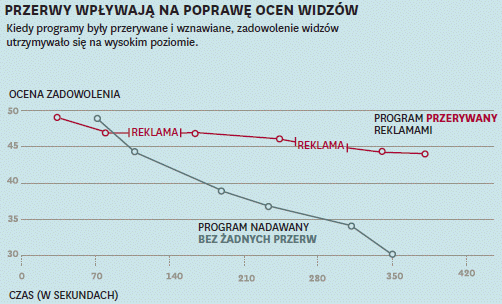According to Harvard Business Review Polska, which published the study, two test groups were shown three types of programs:
- episodes of the comedy series *Taxi*,
- documentary nature films,
- and Bollywood productions.
One group watched the programs without ads, while the other saw them with ad interruptions. The results were surprising: the group that saw the shows with ads was more satisfied with the programs, regardless of the quality of the ads shown.
 source: Harvard Business Review Polska, Why Do We Prefer TV with Ads?
source: Harvard Business Review Polska, Why Do We Prefer TV with Ads?Surprisingly, viewers who watched the version with ads were also willing to pay more for DVD sets of productions by the same directors. The study published by Harvard Business Review Polska found that this difference could be as much as 30%.
- viewers of the ad-free version offered $4.18 for a DVD
- viewers of the ad-supported version were willing to pay up to $5.42 for the same DVD.
The study authors note that this principle is reflected in pay TV, even though it doesn’t include ads. These networks structure their programming with built-in breaks.
- What increases viewer enjoyment isn’t the ads themselves but the breaks in the show, - explains Prof. Leif Nelson in an interview with HBRP. - In series, the plot usually consists of six or more parallel storylines that producers continuously juggle. More complex and unpredictable shows, with twists that naturally introduce breaks, were rated higher than programs with a more linear narrative structure.
This is known as the adaptation effect. The researchers found that this effect is much stronger among younger people. As people age, they need less stimulation to feel pleasure and adapt more slowly.
Nelson, Meyvis, and Galak`s research was also published in the Harvard Business Review Polska special report Why Do We Prefer TV with Ads?
COMMERCIAL BREAK
New articles in section Marketing and PR
Brand visibility in the age of algorithms
Aleksander Pawzun
A few years ago, everything was simpler. It was enough to have a good website, do SEO, run a blog, and publish on social media. Whoever was systematic was visible. Whoever invested in content and positioning gained customers. That world no longer exists.
Queue psychology. Scientists' discovery used in Call Centers
Andrzej Sowula
The discovery first described by psychologists in the second half of 2024 concerns the so-called "relative progress effect". When customers observe fast service at the beginning of their wait, they tolerate slower service much better later in the waiting period.
#POMAGAM2026 Can a New Year's resolution go viral?
wspieramy
Is a million good deeds a lot? Ten-year-old Emilka wants to find out. She just announced the I Resolve to Help campaign on the internet and urges everyone to make a unique New Year's resolution. That we help each other more often in 2026.
See articles on a similar topic:
When a Review Lies. The Growing Threat of Fake Opinions Online
KFi
Popularity of digital marketplaces rises, so does a less welcome trend: fake reviews. These manipulated opinions distort product rankings and mislead consumers, all while unfairly disadvantaging honest businesses. And despite regulatory efforts, the problem is far from solved.
How to reduce food waste? Packaging design matters
KFi
Researchers from China have proven that visual packaging elements and consistent messaging can be effective tools in the fight against global food waste. They published research results showing that designers and marketers can make a real difference.
Browser Fingerprinting. Marketing Uses Digital Traces
BARD
A fingerprint created for each browser can identify not only a device but also a specific user. The data collected this way is mainly used for marketing purposes, which can result in cases where, for instance, a Mac user pays up to 30% more for the same product than a PC user.
Artificial Intelligence, Real Results in Marketing. HubSpot Report
BARD
Although AI is a term that can sometimes evoke concerns, the "AI Trends Report 2024" compiled by analysts at HubSpot shows that for many, artificial intelligence is the future of marketing.





























